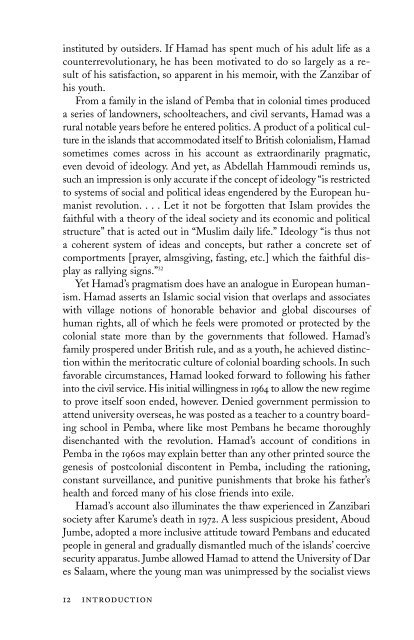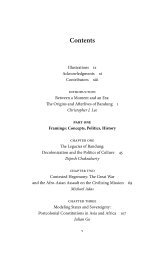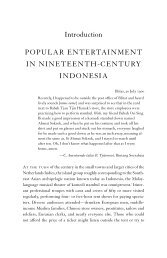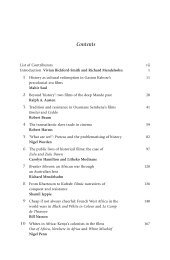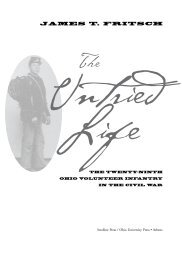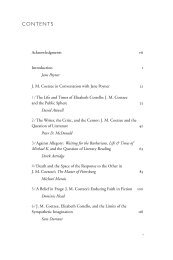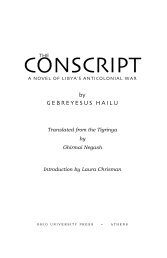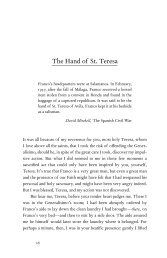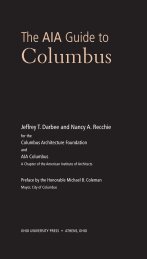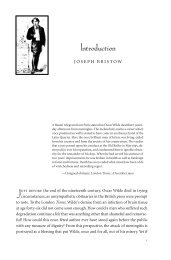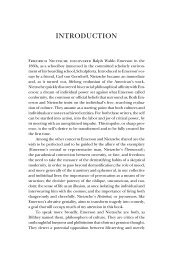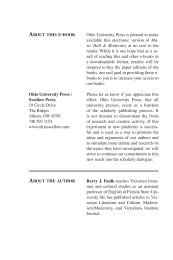Race, Revolution, and the Struggle for Human Rights in Zanzibar ...
Race, Revolution, and the Struggle for Human Rights in Zanzibar ...
Race, Revolution, and the Struggle for Human Rights in Zanzibar ...
You also want an ePaper? Increase the reach of your titles
YUMPU automatically turns print PDFs into web optimized ePapers that Google loves.
<strong>in</strong>stituted by outsiders. If Hamad has spent much of his adult life as a<br />
counterrevolutionary, he has been motivated to do so largely as a result<br />
of his satisfaction, so apparent <strong>in</strong> his memoir, with <strong>the</strong> <strong>Zanzibar</strong> of<br />
his youth.<br />
From a family <strong>in</strong> <strong>the</strong> isl<strong>and</strong> of Pemba that <strong>in</strong> colonial times produced<br />
a series of l<strong>and</strong>owners, schoolteachers, <strong>and</strong> civil servants, Hamad was a<br />
rural notable years be<strong>for</strong>e he entered politics. A product of a political culture<br />
<strong>in</strong> <strong>the</strong> isl<strong>and</strong>s that accommodated itself to British colonialism, Hamad<br />
sometimes comes across <strong>in</strong> his account as extraord<strong>in</strong>arily pragmatic,<br />
even devoid of ideology. And yet, as Abdellah Hammoudi rem<strong>in</strong>ds us,<br />
such an impression is only accurate if <strong>the</strong> concept of ideology “is restricted<br />
to systems of social <strong>and</strong> political ideas engendered by <strong>the</strong> European humanist<br />
revolution. . . . Let it not be <strong>for</strong>gotten that Islam provides <strong>the</strong><br />
faithful with a <strong>the</strong>ory of <strong>the</strong> ideal society <strong>and</strong> its economic <strong>and</strong> political<br />
structure” that is acted out <strong>in</strong> “Muslim daily life.” Ideology “is thus not<br />
a coherent system of ideas <strong>and</strong> concepts, but ra<strong>the</strong>r a concrete set of<br />
comportments [prayer, almsgiv<strong>in</strong>g, fast<strong>in</strong>g, etc.] which <strong>the</strong> faithful display<br />
as rally<strong>in</strong>g signs.” 32<br />
Yet Hamad’s pragmatism does have an analogue <strong>in</strong> European humanism.<br />
Hamad asserts an Islamic social vision that overlaps <strong>and</strong> associates<br />
with village notions of honorable behavior <strong>and</strong> global discourses of<br />
human rights, all of which he feels were promoted or protected by <strong>the</strong><br />
colonial state more than by <strong>the</strong> governments that followed. Hamad’s<br />
family prospered under British rule, <strong>and</strong> as a youth, he achieved dist<strong>in</strong>ction<br />
with<strong>in</strong> <strong>the</strong> meritocratic culture of colonial board<strong>in</strong>g schools. In such<br />
favorable circumstances, Hamad looked <strong>for</strong>ward to follow<strong>in</strong>g his fa<strong>the</strong>r<br />
<strong>in</strong>to <strong>the</strong> civil service. His <strong>in</strong>itial will<strong>in</strong>gness <strong>in</strong> 1964 to allow <strong>the</strong> new regime<br />
to prove itself soon ended, however. Denied government permission to<br />
attend university overseas, he was posted as a teacher to a country board<strong>in</strong>g<br />
school <strong>in</strong> Pemba, where like most Pembans he became thoroughly<br />
disenchanted with <strong>the</strong> revolution. Hamad’s account of conditions <strong>in</strong><br />
Pemba <strong>in</strong> <strong>the</strong> 1960s may expla<strong>in</strong> better than any o<strong>the</strong>r pr<strong>in</strong>ted source <strong>the</strong><br />
genesis of postcolonial discontent <strong>in</strong> Pemba, <strong>in</strong>clud<strong>in</strong>g <strong>the</strong> ration<strong>in</strong>g,<br />
constant surveillance, <strong>and</strong> punitive punishments that broke his fa<strong>the</strong>r’s<br />
health <strong>and</strong> <strong>for</strong>ced many of his close friends <strong>in</strong>to exile.<br />
Hamad’s account also illum<strong>in</strong>ates <strong>the</strong> thaw experienced <strong>in</strong> <strong>Zanzibar</strong>i<br />
society after Karume’s death <strong>in</strong> 1972. A less suspicious president, Aboud<br />
Jumbe, adopted a more <strong>in</strong>clusive attitude toward Pembans <strong>and</strong> educated<br />
people <strong>in</strong> general <strong>and</strong> gradually dismantled much of <strong>the</strong> isl<strong>and</strong>s’ coercive<br />
security apparatus. Jumbe allowed Hamad to attend <strong>the</strong> University of Dar<br />
es Salaam, where <strong>the</strong> young man was unimpressed by <strong>the</strong> socialist views<br />
12 <strong>in</strong>troduction


